Yes, chickens can eat beetles. Beetles are a natural part of many wild birds’ diets, including chickens. They provide a good source of protein and essential nutrients that can benefit the bird’s health, provided they have not been exposed to pesticides or other harmful chemicals.
Quick Summary
- Chickens can eat beetles.
- Beetles are a natural protein source and can offer nutritional benefits.
- Key benefits include protein and essential nutrient content, while risks may include potential exposure to pesticides.
- Feeding should be done in moderation as part of a varied diet.
Overview of Beetles
Beetles are a diverse group of insects with a hard exoskeleton and over 350,000 species. They are part of many ecosystems and are known for their role in the food chain. Beetles are rich in protein, making them an excellent treat for chickens who naturally forage for insects.
Benefits and Risks of Beetles for Chickens
Beetles offer chickens a high-protein snack that is similar to their natural foraging finds in the wild. Protein is essential for chickens’ growth, feather development, and egg production. However, there is a risk in feeding chickens beetles that have been exposed to pesticides or come from contaminated environments that can potentially harm the chicken’s health.
Feeding Guidelines
Beetles should be fed to chickens in moderation and not as a primary food source. Ensure that beetles are free from toxins and pesticides before feeding. Fresh, live beetles from a safe environment are best. It’s preferable to offer a variety of insects and foods to keep the diet balanced.
Alternatives
If there are concerns about the safety of the beetles available, consider other protein-rich alternatives such as mealworms, crickets, or commercial chicken treats that are safe and nutritious for poultry consumption.
Expert Opinions
Poultry nutritionists and veterinarians generally agree that insects like beetles can be a healthy part of a chicken’s diet. The key is to ensure they are sourced from a pesticide-free environment. Studies have also noted the benefits of insect protein in poultry diets for promoting growth and egg production.
Frequently Asked Questions
If you’ve just learned that chickens can eat beetles, you may have more questions about incorporating them into their diet. Below are some common questions and answers related to feeding beetles to chickens.
Are all types of beetles safe for chickens to eat?
While most types of beetles are safe for chickens, it’s always best to avoid colorful or bright beetles which could be toxic. Stick to common, non-toxic varieties and ensure they haven’t been exposed to chemicals.
How often should I feed beetles to my chickens?
Beetles should be considered a treat and fed in moderation alongside a balanced diet. This could be a couple of times a week as part of a mixed diet including grains, greens, and other protein sources.
Can beetles replace commercial chicken feed?
No, beetles should not replace commercial chicken feed because they do not provide complete nutrition that chickens need. They should only be an occasional treat to complement a well-rounded diet.

















